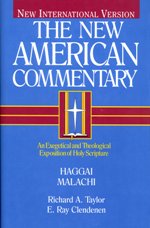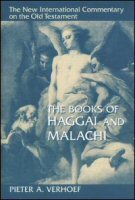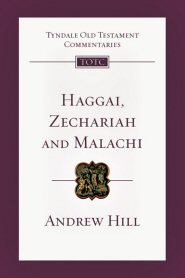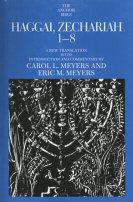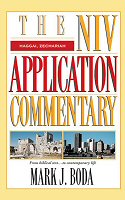Best Resources on Haggai
The Jews who returned to Jerusalem after the Babylonian exile began rebuilding the temple around 537 BC, but because of opposition they became discouraged and stopped. When Haggai’s prophetic career began in 520 BC, he challenged their decision to stop building God’s house while they continued building houses for themselves. Haggai aimed to convince the people and their leaders to finish the temple—to make sacrifices to obey God instead of focusing entirely on their own needs.
—Faithlife Study Bible, Lexham Press
Everything You Need to Study & Teach Haggai/h1>
Expository Preaching Kits are curated resources all focused on helping you teach a single book of the Bible—keeping you prepared without weighing you down.
Best Commentaries on Haggai
E. Ray Clendenen and Richard A. Taylor, New American Commentary (NAC), B&H, 2004, 471 pp.
This volume of the NAC covers two minor prophets who deal with major issues still facing God's people today. Haggai challenges us to leave the kingdom of self and serve the kingdom of God. Malachi addresses issues of worship, marital fidelity, and materialism. Solid historical, grammatical, and theological exposition will renew the mind and fill the heart.
- Level: Intermediate
- Type: Expository
Pieter A. Verhoef, New International Commentary on the Old Testament (NICOT), Eerdmans, 1987, 384 pp.
This commentary by Pieter A. Verhoef offers a thorough exegesis and exposition of Haggai and Malachi—two important books of Scripture that, unfortunately, are not only little studied but have sometimes been maligned by contemporary scholarship—and stresses the relevance of these prophets’ messages in terms of continuity and discontinuity for the Christian Church.
- Level: Intermediate
- Type: Expository
Joyce G. Baldwin, Tyndale Old Testament Commentaries (TOTC), InterVarsity Press, 1972, 202 pp.
Three neglected but important prophets receive a fresh and penetrating analysis in this introduction and commentary. For each prophet's work, Joyce Baldwin first considers the general issues of author, text, and message, then offers a passage-by-passage commentary. "Considerable attention has been given in the book to background material, and proper consideration is accorded to the views of those from whom the author differs," writes reviewer R. K. Harrison. "In expounding the text, Baldwin produces evidence of balanced scholarship and a high degree of spiritual insight."
- Level: Basic
- Type: Devotional
Carol Meyers and Eric M. Meyers, Anchor Yale Bible (AYB), Yale University Press, 2008, 552 pp.
Haggai and Zechariah were written during a critical period in Israel’s history, the momentous return of the Jews from Babylonian exile. Following the conquest of Babylon by the Persian Empire, the Israelites sought to reestablish their ethnic and religious legacy in Judah. This was a time of profound turmoil and uncertainty, and Haggai and Zechariah provided a crucial measure of support and inspiration. They rallied Israel’s energies and exhorted their fellow countrymen to heed the word of God. Under their guidance, the Jews restored the temple at Jerusalem, which had been destroyed by Nebuchadnezzar's armies. Together the two prophets guided Israel through an important transitional epoch and reconciled the influences of Persia’s dominion with the sacred traditions of the Hebrew people.
- Level: Advanced
- Type: Technical
Mark J. Boda, NIV Application Commentary (NIVAC), Zondervan, 2004, 576 pp.
The books of Haggai and Zechariah represent a golden period in Old Testament history, but they are often overlooked. These two minor prophets speak a major message to the Church today. It’s one that calls us as a community of faith to the priority of God’s house and inspires us with glimpses of its future glory.
- Level: Intermediate
- Type: Devotional
Best Books on Haggai
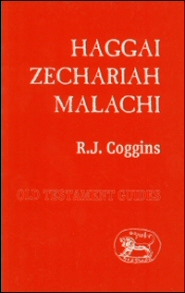
Sheffield Old Testament Guides: Haggai, Zechariah and Malachi
Coggins first analyzes the historical setting of the books, including the concept of prophets under the oppression of foreign rulers. He describes the editorial framework and then analyzes the content of Haggai and Zechariah 1–8. The author discusses the problem of “theocracy” versus “eschatology” as it related to prophets of the postexilic times, then moves on to address Zechariah 9–14 and Malachi. The last chapter of this book puts the contents and ideals of these three biblical works into larger perspective, looking forward into the times of the New Testament writers.
Learn more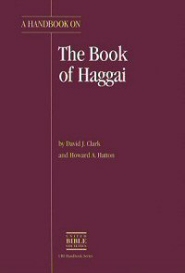
A Handbook on the Book of Haggai
What if you were responsible for translating God's Word into a language that never had a Bible before? Can you imagine the burden you would feel to do a good job? God takes his Word pretty seriously, and you would certainly do everything in your power to make sure that you were not putting words into God's mouth but that you were providing a text that clearly communicated God's Word as closely to the original as possible. This challenge to understand the heart of the original Scriptures to put the original text into a new language was the impetus for the United Bible Societies to create handbooks for Bible translators working on this very thing. The United Bible Societies' Handbook Series is a comprehensive verse-by-verse guide to understanding exactly what is being communicated by the author in the original Scriptures.
Learn more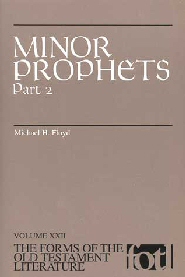
Forms of the Old Testament Literature Series: Minor Prophets, Part 2 (FOTL)
In this volume, Floyd presents a complete form-critical analysis of the last six books in the Minor Prophets: Nahum, Habakkuk, Zephaniah, Haggai, Zechariah, and Malachi. By looking carefully at the literary genre and internal structure of each book, Floyd uncovers the literary conventions that help shape the composition of these prophetic books in their final form. His approach yields fresh views of how the parts of each book fit together to make up the whole—particularly with respect to Nahum, Haggai, and Malachi—and provides a basis for reconsidering how each book is historically related to the time of the prophet for whom it is named. This work will be useful to scholars because it advances the discussion regarding the holistic reading of prophetic books and to pastors and students because it shows how analysis of literary form can lead to a more profound understanding of the messages of the Minor Prophets.
Learn more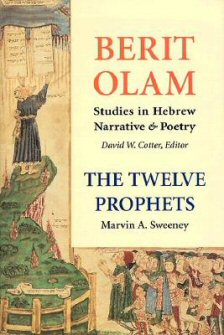
Berit Olam: Studies in Hebrew Narrative & Poetry: The Twelve Prophets, vols. 1 and 2
By employing a combination of literary methodologies, such as reader response criticism, canonical criticism, and structural form criticism, Sweeney establishes the literary structure of the Book of the Twelve as a whole and of each book with their respective ideological or theological perspectives. An introductory chapter orients readers to questions posed by reading the Book of the Twelve as a coherent piece of literature and to a literary overview of the Twelve. Sweeney then treats each of the twelve individual prophetic books in the order of the Masoretic canon, providing a discussion of each one's structure, theme, and outlook. This is followed by a detailed literary discussion of the textual units that comprise the book.
Learn more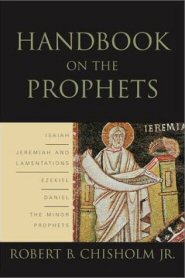
Handbook on the Prophets
The prophetic books of the Bible contain some of the most difficult passages in the entire Old Testament and can prove especially confusing for those new to this corpus. Handbook on the Prophets offers a thorough and insightful introduction for the beginning student of the Old Testament prophetic literature. Robert Chisholm guides students through the important and often complex writings of Isaiah, Jeremiah and Lamentations, Ezekiel, Daniel, and the Minor Prophets.
Learn moreBest Courses on Haggai
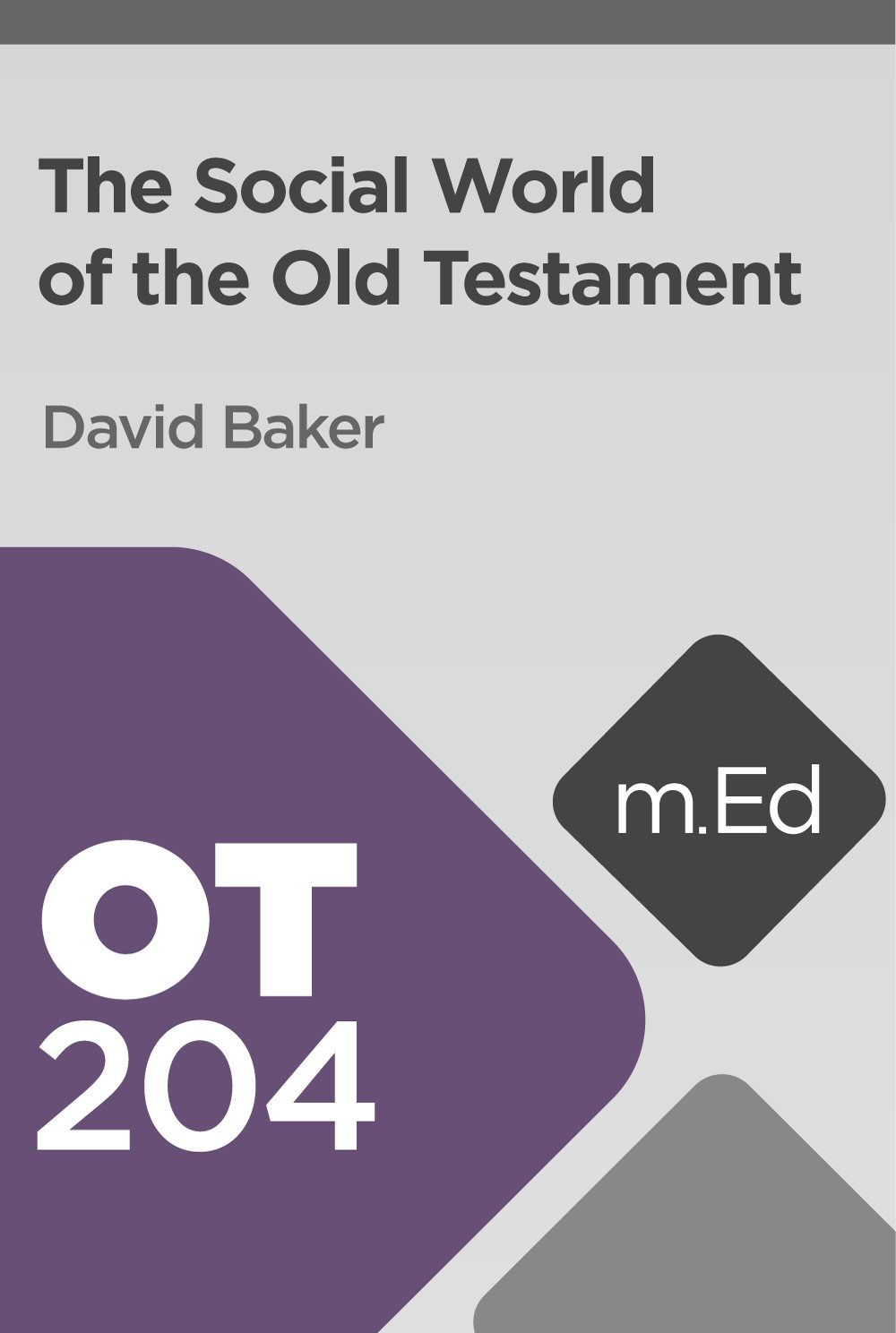
Mobile Ed: OT204 Social World of the Old Testament (4 hour course)
In an age of international travel and migration, we’re familiar with people who look, sound, eat, and believe differently than we do. To become friends, it’s helpful to understand where they come from and how they do things differently, or the same, as we do. In the same way it is necessary to understand someone who comes from a different place than we do, how much more necessary is it to understand someone who is from not only a different geographical place but also a different time than we are? The Old Testament starts at the beginning of the world. This course will undertake the task of crossing the bridges of geography, climate, time, and a landscape unknown to us: ancient Israel. Throughout the course, David W. Baker will address aspects of life from our own culture and time, as well as family structure and societal systems from ancient Israelite life. As we Learn more about the social world of the Old Testament, we will be struck not only by our differences but also by our common humanity and that we share the same dreams, hopes, and fears as they did.
Learn more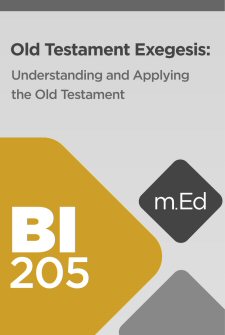
Mobile Ed: BI205 Old Testament Exegesis: Understanding and Applying the Old Testament (15 hour course)
Embark on a journey of OT Hebrew exegesis with Jason DeRouchie. The books of the OT were the only Scriptures Jesus had. It was books like Genesis, Deuteronomy, Isaiah, and Psalms that shaped Jesus’ upbringing and that guided his life in ministry as the Jewish Messiah. It was these Scriptures that Jesus identified as God’s Word and he considered to be authoritative; it was these Scriptures he believed called people to know and believe in God and guarded them against doctrinal error and hell. This course will give you the tools you need to access meaning in the OT, then apply it to your life. It will help you to grow in reading God’s living Word for depth and not just distance.
Learn more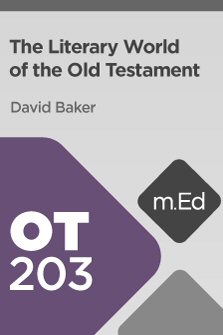
Mobile Ed: OT203 Literary World of the Old Testament (6 hour course)
Join David W. Baker on a whirlwind tour to explore the Old Testament from many different angles and how it relates to ancient Near Eastern literature. From creation accounts and stories of destruction to Wisdom Literature, discover different biblical literary genres that have parallels in ancient Near Eastern literature. Explore extrabiblical historical texts that mention key events and figures from the Old Testament. Understand how Israel fits into and is impacted by its ancient Near Eastern environment but also how it is separate and unique, mainly on a theological level but also by its distinct worldview.
Learn more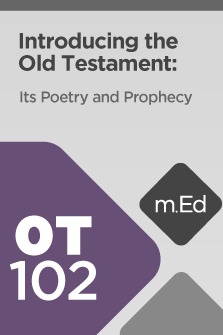
Mobile Ed: OT102 Introducing the Old Testament: Its Poetry and Prophecy (6 hour course)
This course provides a practical foundation for reading the poetry and prophecy of the Old Testament. Dr. David Baker begins by discussing poetic writing in general, then the elements specific to both Hebrew and English poetry. Applying these elements to the text, he examines the content, structure, and themes of the Psalms, Proverbs, Lamentations, Job, Ecclesiastes, and the Song of Songs. Dr. Baker then turns to the prophetic books, providing historical background, theological motifs, and the structure and content of specific books. He shows that these ancient messages remain relevant in modern life.
Learn more